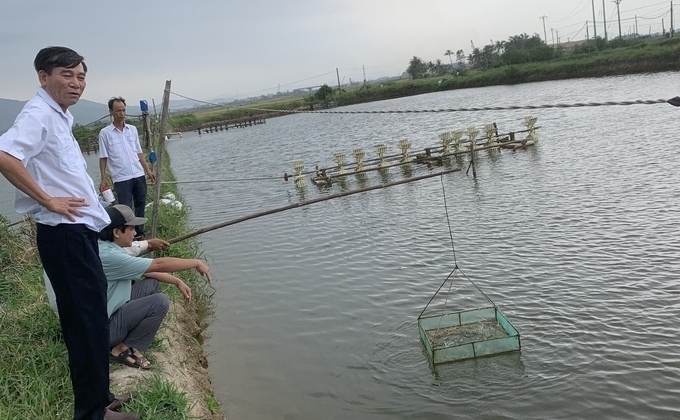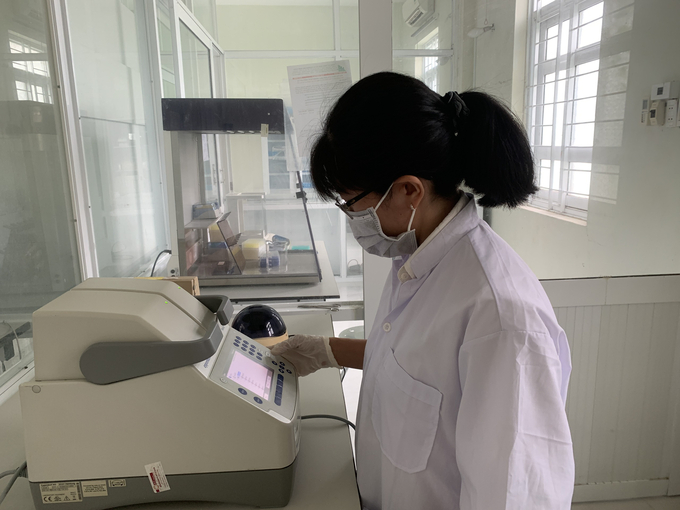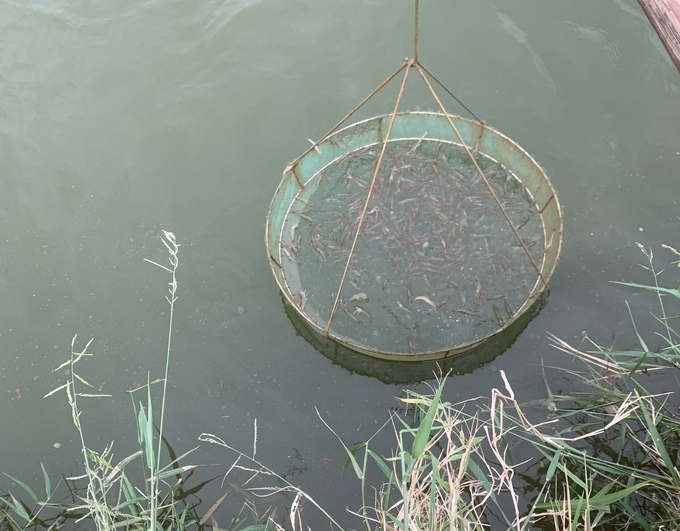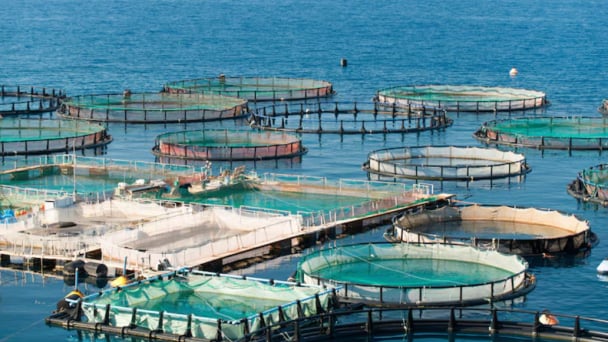June 4, 2025 | 00:17 GMT +7
June 4, 2025 | 00:17 GMT +7
Hotline: 0913.378.918
June 4, 2025 | 00:17 GMT +7
Hotline: 0913.378.918

Phu Yen province's Animal Health staffs monitoring disease outbreaks in brackish water shrimp farming areas. Photo: Kim So.
Mr. Tran Van Hao, a shrimp farmer in Hoa Hiep Trung commune, Dong Hoa town, reported that diseases on shrimp have spread aggressively across the farming area since the beginning of the year. Most notably, shrimps in certain farming areas suffered from Acute Hepatopancreatic Necrosis Disease.
Mr. Hao recently raised a shrimp crop in a 3000-square-meter pond for 30 days. Acute hepatopancreatic necrosis killed all of the farmed shrimp, causing an estimated loss of millions of Vietnam Dong. After the farmed shrimp's death, his family disinfected the water environment in order to prevent the infection from spreading to the outside environment as well as the following crops.
According to the Phu Yen Sub-Department of Livestock Production and Animal Health, the province has reported over 20 hectares of infected vannamei shrimp ponds since the beginning of 2023, which is a decrease of 30% compared to the same period in 2022. The main cause of death in these shrimp farming areas is acute hepatopancreatic necrosis disease. Additionally, a 3.3-hectare grouper farming area suffered from viral nervous necrosis and parasites.

Phu Yen Animal Health staffs collecting samples of farmed shrimp for disease testing. Photo: KS.
Mr. Nguyen Van Lam, Director of Phu Yen Sub-Department of Livestock Production and Animal Health attributed the cause of diseases in aquacultural products to adverse weather, increasingly polluted farming areas, and harsh aquatic habitat. Diseases develop rapidly because the limited aquaculture infrastructure has resulted in uncontrolled farming environment.
On the other hand, the majority of farmers fail to protect their farming environment or report diseases to management agencies when they occue. Regarding shrimp farming ponds affected with acute hepatopancreatic necrosis disease, Mr. Nguyen Van Lam warned farmers against discharging water into the environment without treatment.
Farmers are advised to apply integrated disease prevention measures including regular monitoring of shrimp health. Additionally, the shrimp feeding regime must be controlled to avoid excess feed and pollution at the pond's bottom.
In addition, it is necessary to monitor and adjust appropriate environmental factors; supplement vitamin C and minerals to enhance resistance for shrimp. Farmers are required to immediately alert local authorities and animal health agencies when shrimp die.
According to Mr. Nguyen Van Lam, Phu Yen province is approaching the hot season. Consequently, the long-lasting heat waves at high temperatures will accelerate the of decomposition process for organic matter in the aquaculture environment. As a result, aquacultural products are at a high risk of death due to environmental incidents.

Farmers are required to immediately alert local authorities and animal health agencies when shrimp die. Photo: Kim So.
In addition, the prolonged heat will alter hydrological factors beyond the acceptable threshold of aquaculture, thereby reducing the health and resistance of aquacultural products.
Phu Yen Sub-Department of Livestock Production and Animal Health recommends brackish shrimp farming households to follow the seasonal schedule under the guidance of the Department of Agriculture and Rural Development.
Additionally, farmers are advised to: purchase quality breeding stock that are tested for dangerous diseases and quarantined in accordance with regulations; increase the resistance of shrimp by periodically adding vitamins and minerals to the feed; manage the feeding regime to avoid excess feed polluting the farming environment.
When a disease outbreak occurs, farmers should only supply water into the pond in emergencies. Supply water must be treated with pathogens before being pumped into ponds.
Furthermore, farming households must regularly monitor the pond's environmental parameters to adjust these factors within the acceptable thresholds. This will reduce the effects of drastic fluctuations on farmed shrimp's health and resistance to disease.
Commercial-size farmed shrimp must be harvest promptly to minimize damage in case of environmental problems or diseases.
According to Phu Yen Sub-Department of Livestock Production and Animal Health, the aquaculture environment changed drastically due to the complicated and extreme weather in 2022. Consequently, brackish water shrimp farmers in the province were faced with widespread epidemic. Accordingly, over 104 hectares of shrimp farming area were infected, accounting for 5% of the total farming area and an increase of 70% compared to 2021. Namely, more than 98 hectares of acute hepatopancreatic necrosis disease and roughly 6 hectares of white spot disease were reported.
Translated by Nguyen Hai Long

(VAN) Technology is redrawing the map of Vietnamese aquaculture: more modern, greener, and more sustainable.

(VAN) Novel process harnesses machine learning to reveal groups of genes that determine how efficiently plants use nitrogen.

(VAN) Several scientists and farmers are experimenting with soil treatment in some key durian-growing regions such as Cai Lay (Tien Giang), Dak Song, Gia Nghia, and Dak R’lap (Dak Nong).
/2025/05/25/4127-3-073637_820.jpg)
(VAN) Thanks to the promotion from an FAO-implemented project, vegetable production in greenhouses in Moc Chau has seen strong development, from 1.5 hectares in 2021 to nearly 50 hectares in 2024.

(VAN) FAO has recently supported USD 140,000 to implement the project 'Risk mitigation human-animal interface risks through disease control initiatives in pig farming.'

(VAN) The People's Committee of Tra Vinh province has approved an adjustment to the investment policy for the Green Hydrogen Plant project, increasing its area to approximately 52.76 hectares.
![Reducing emissions from rice fields: [2] Farmers’ commitment to the soil](https://t.ex-cdn.com/nongnghiepmoitruong.vn/608w/files/news/2025/05/05/dsc08881jpg-nongnghiep-140632.jpg)
(VAN) Clean rice cultivation model in Thuong Tan commune, Bac Tan Uyen district, is assisting local residents in achieving sustainable agriculture by substantially reducing costs, increasing productivity, and protecting the environment.